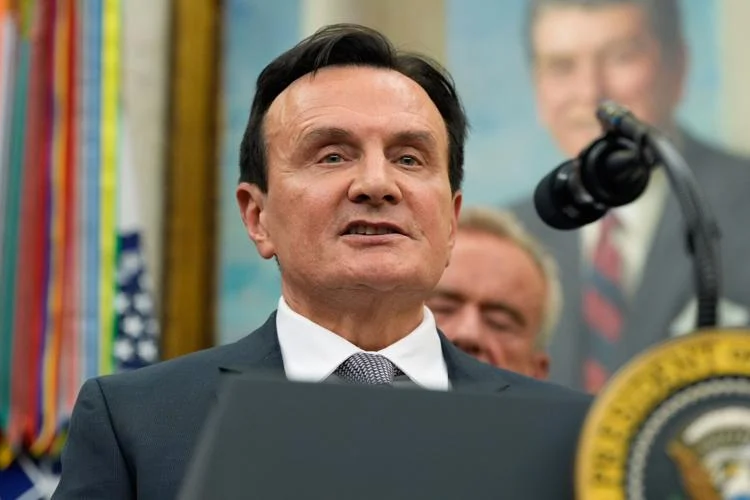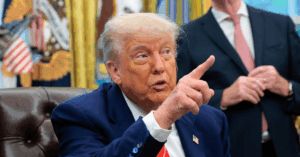AstraZeneca has become the second major pharmaceutical manufacturer to sign a “most favored nation” pricing agreement with the Trump administration, committing to match the lowest drug prices offered in developed nations for Medicaid programs and newly launched products.
President Donald Trump announced the deal October 10 in the Oval Office alongside AstraZeneca CEO Pascal Soriot, who acknowledged that negotiations had “really kept me up at night.” The agreement follows a similar arrangement with Pfizer announced September 30, establishing a pattern the administration hopes will spread across the pharmaceutical sector.
Agreement Terms Target Medicaid and New Launches
Under the confidential arrangement, AstraZeneca will provide every state Medicaid programs access to most-favored-nation pricing on its drug portfolio. The company also committed to launching all new innovative medicines at MFN prices, matching the lowest costs available in Organization for Economic Cooperation and Development countries.
The deal requires AstraZeneca to repatriate increased foreign revenues realized from Trump’s trade policies for the benefit of American patients. The company will also offer deep discounts off list prices through direct-to-consumer channels via the TrumpRx platform, scheduled to become operational in January 2026.
Three respiratory products feature prominently in the agreement: BEVESPI AEROSPHERE and BREZTRI AEROSPHERE for chronic obstructive pulmonary disease, and AIRSUPRA for asthma. The White House claims discounts ranging from 96% to 654% of deal prices for direct purchases—though the 654% figure has drawn scrutiny as mathematically improbable.
AstraZeneca already offers certain asthma inhalers, including Airsupra and Symbicort, for $35 monthly to eligible U.S. patients following pressure from lawmakers including Sen. Bernie Sanders, who launched an investigation into asthma drug pricing in early 2024.
Manufacturing Investment Sweetens Package
AstraZeneca announced a $50 billion U.S. manufacturing and R&D investment commitment through 2030. The company is building a facility in Charlottesville, Virginia, to produce advanced pharmaceutical ingredients supporting its chronic disease and oncology pipelines, creating 3,600 jobs.
Like Pfizer, AstraZeneca receives a three-year reprieve from certain pharmaceutical import tariffs. “The tariffs were a big reason he came here,” Trump said of Soriot, acknowledging that tariff threats drove negotiations. “For almost everybody that’s here, most of them are here because of tariffs.”
Executive Order Framework and Timeline
The agreements stem from Trump’s May 12, 2025 executive order directing federal agencies to negotiate drug prices based on international reference pricing. On July 31, the administration sent letters to 17 pharmaceutical manufacturers demanding MFN pricing commitments within 60 days or face new payment limits.
According to the White House, Americans pay more than three times the price for brand-name drugs compared to other OECD nations, even after manufacturer discounts. The U.S. represents less than 5% of the global population but generates approximately 75% of worldwide pharmaceutical profits.
The administration claims 9 million American patients use AstraZeneca medicines, with potential benefits extending to 25 million asthma sufferers and 16 million COPD patients. The White House projects “hundreds of millions of dollars” in Medicaid savings, though specific calculations remain undisclosed.
Industry Experts Express Skepticism
Legal and policy experts question whether the agreements deliver meaningful savings or represent substantive concessions from manufacturers.
“Confidential agreements are not a good way to make public policy,” said Rachel Sachs, a Washington University law professor. “It’s not clear what exactly the drugmakers have agreed to, who will enforce the provisions and who is likely to benefit.”
Spencer Perlman, director of health care policy research at Veda Partners, suggested the deals may preempt more aggressive regulatory action. “Pfizer and AstraZeneca won’t surrender anything of value with most of the measures,” Perlman said, noting that agreeing to introduce new drugs at MFN pricing could prove significant—though assessment requires more transparency.
Several factors complicate the savings calculation:
- Medicaid already receives substantial manufacturer discounts, limiting potential for additional reductions
- Direct-to-consumer cash pricing excludes most patients who rely on insurance coverage
- AstraZeneca already offers certain products at discounted rates following congressional pressure
- Full medication lists and pricing structures remain confidential


 Sign up to the free weekly newsletter for all the latest news, resources and podcasts in pharma manufacturing.
Sign up to the free weekly newsletter for all the latest news, resources and podcasts in pharma manufacturing. 







